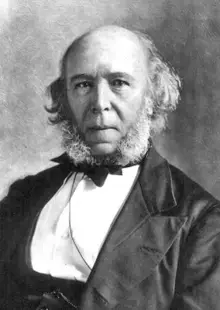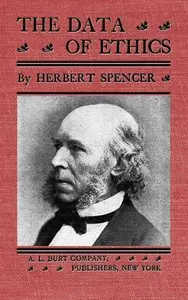
Herbert Spencer
Herbert Spencer was an English polymath active as a philosopher, psychologist, biologist, sociologist, and anthropologist. Spencer originated the expression "survival of the fittest", which he coined in Principles of Biology (1864) after reading Charles Darwin's 1859 book On the Origin of Species. The term strongly suggests natural selection, yet Spencer saw evolution as extending into realms of sociology and ethics, so he also supported Lamarckism.

Essays on Education and Kindred Subjects Everyman's Library
In a time of old traditions, a revolutionary call emerges for an education grounded not in the past, but in the practical sciences that shape our lives and futures.
By Herbert Spencer

First Principles
A philosopher attempts to link the understanding of existence across science and faith.
By Herbert Spencer

The Right to Ignore the State
Dare to envision a world where individuals possess the radical freedom to unshackle themselves from the chains of governmental authority.
By Herbert Spencer

The Philosophy of Style
Discover techniques to craft words that resonate and captivate, ensuring messages cut through the noise to be remembered.
By Herbert Spencer

Essays: Scientific, Political, & Speculative; Vol. 1 of 3 Library Edition (1891), Containing Seven Essays not before Republished, and Various other Additions.
Explore a world where science and society collide, challenging the very foundations of creation and progress with groundbreaking theories of evolution.
By Herbert Spencer

The Data of Ethics
Explore how morality shifts away from old-fashioned beliefs and moves toward a system based on science and the way human actions shape society.
By Herbert Spencer

The Principles of Biology, Volume 2 (of 2)
Embark on a scientific journey through the intricate structures and functions of living organisms, shaped by the forces of evolution, in this exploration of life's fundamental principles.
By Herbert Spencer

The Principles of Biology, Volume 1 (of 2)
Embark on a journey to uncover the basic rules that guide life, where the organic world's very building blocks and their interaction with the environment are explored through the lens of groundbreaking insights.
By Herbert Spencer

The Factors of Organic Evolution
Explore the 19th-century scientific debates on the roles of natural selection and inherited traits in shaping the development of life.
By Herbert Spencer

Essays: Scientific, Political, & Speculative; Vol. 2 of 3 Library Edition (1891), Containing Seven Essays not before Republished, and Various other Additions.
Venture back in time to explore the evolution of science, philosophy, and societal norms through the eyes of a 19th-century thinker.
By Herbert Spencer

Index of the Project Gutenberg Works of Herbert Spencer
Explore the collected works of a 19th-century thinker as he examines the evolution of knowledge, ethics, and society itself.
By Herbert Spencer

Illustrations of Universal Progress: A Series of Discussions
Discover how everything from societies to living beings evolve from simple beginnings to complex structures through a universal force.
By Herbert Spencer

Essays: Scientific, Political, & Speculative; Vol. 3 of 3 Library Edition (1891), Containing Seven Essays not before Republished, and Various other Additions.
Explore societal norms and individual expression through thought-provoking essays that link political reform to unique personal styles, challenging the very foundations of ethics and philosophy.
By Herbert Spencer
